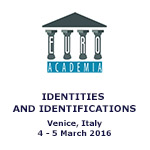Euroacademia Conferences
 Europe Inside-Out: Europe and Europeanness Exposed to Plural Observers (9th Edition) April 24 - 25, 2020
Europe Inside-Out: Europe and Europeanness Exposed to Plural Observers (9th Edition) April 24 - 25, 2020 Identities and Identifications: Politicized Uses of Collective Identities (9th Edition) June 12 - 13, 2020
Identities and Identifications: Politicized Uses of Collective Identities (9th Edition) June 12 - 13, 2020 8th Forum of Critical Studies: Asking Big Questions Again January 24 - 25, 2020
8th Forum of Critical Studies: Asking Big Questions Again January 24 - 25, 2020 Re-Inventing Eastern Europe (7th Edition) December 13 - 14, 2019
Re-Inventing Eastern Europe (7th Edition) December 13 - 14, 2019 The European Union and the Politicization of Europe (8th Edition) October 25 - 26, 2019
The European Union and the Politicization of Europe (8th Edition) October 25 - 26, 2019 Identities and Identifications: Politicized Uses of Collective Identities (8th Edition) June 28 - 29, 2019
Identities and Identifications: Politicized Uses of Collective Identities (8th Edition) June 28 - 29, 2019 The European Union and the Politicization of Europe (7th Edition) January 25 - 26, 2019
The European Union and the Politicization of Europe (7th Edition) January 25 - 26, 2019 7th Forum of Critical Studies: Asking Big Questions Again November 23 - 24, 2018
7th Forum of Critical Studies: Asking Big Questions Again November 23 - 24, 2018 Europe Inside-Out: Europe and Europeanness Exposed to Plural Observers (8th Edition) September 28 - 30, 2018
Europe Inside-Out: Europe and Europeanness Exposed to Plural Observers (8th Edition) September 28 - 30, 2018 Identities and Identifications: Politicized Uses of Collective Identities (7th Edition) June 14 - 15, 2018
Identities and Identifications: Politicized Uses of Collective Identities (7th Edition) June 14 - 15, 2018
Public Movement: Performing Politics through Conflictual Coreographies
-
-

-
Presentation speakers
- Francesco Spampinato, Sorbonne Nouvelle, Paris
Abstract:
Led by Dana Yahalomi, Israeli collective Public Movement is a rare case within the rising phenomenon of cooperative art, because it is organized hierarchically. Its structure, however, is itself part of its exploration on how governmental organizations produce consensus. ‘Everywhere power is institutionally structured into
organizations’, Yahalomi affirms, ‘We are working with widely exercised power structures but then challenge them.’ Public Movement’s choreographed public performances, often in collaboration with state institutions, simulate how governments act, involving the audience – often anonymous and unaware passers-by – in the
production of a collective awareness through art and play. The collective’s actions, in Israel and abroad, always involve discourse, they are place and time-specific – or rather context-specific we should say – and therefore unique. As in the tradition of performance art and happening, they cannot be repeated: their success relies precisely on the unexpected effect they reach in the public sphere. After conducting community-based researches through discussions and interviews, the group stages public choreographies and rituals such as parades, referendums, dances and games. This practice, dubbed by its members as ‘performing politics’, has the aim of catering to national, social, and political needs, not addressing specific issues though, but in universal terms. Public Movement was born with the aim to offer an alternative to
official Israeli state events and since its foundation in 2006, has performed also in Germany, Austria, Poland, Sweden, Finland, Taiwan, and the United States. Collaborating with local authorities such as police precincts, military units, fire fighters, and government representatives, the group’s actions invite the audience to perform in situations of unity, resistance, choice, or obedience. The idea is to use aesthetics as a tool to temporarily reflect on social mechanisms to which we subjugate without questioning. The concept of
‘conflict’ becomes in the group’s hands ‘a productive means of shifting power’ or, rather, an autonomous territory to explore democracy, political persuasion and ideological dissent.
www.publicmovement.org -
Related Presentations

National Identity and Public Goods Provision
- Ani Harutyunyan

Transcending Borders: Sheila Mysorekar’s Reflections on Transnational Identities
- Jennifer E. Michaels

The ŁÓDŹ-ORWO Collection: Typographical Identity of Socioeconomic Transition
- Jan Kubasiewicz
- Ewa Satalecka













